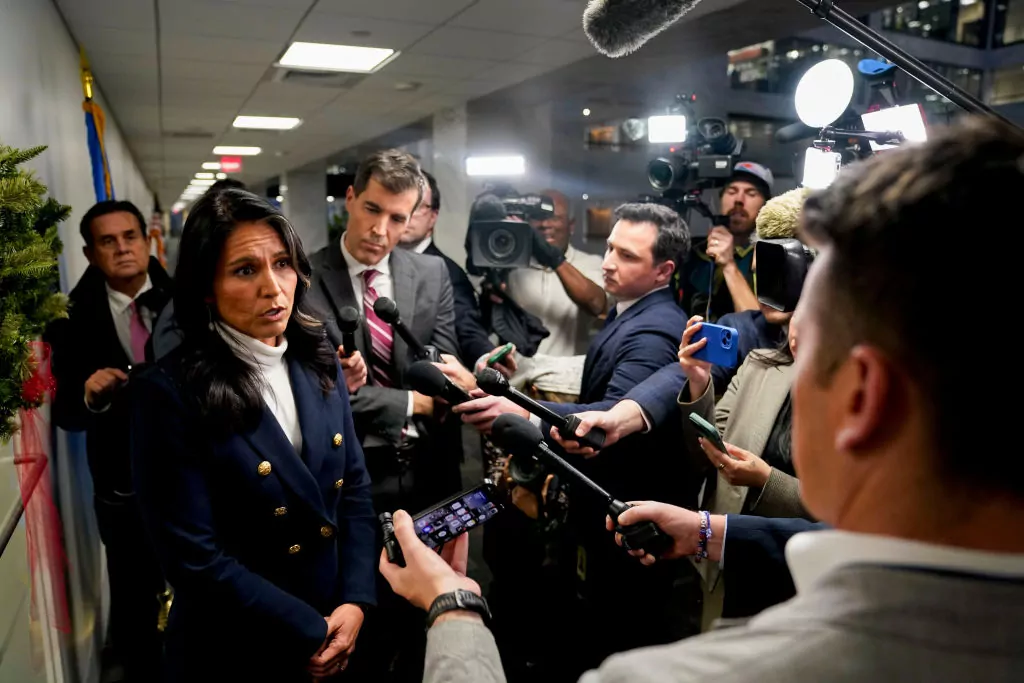

It could take weeks, and in some cases months, to confirm President-elect Donald Trump’s Cabinet nominees as the Republican-led Senate prepares for his return to the White House.
Senate Majority Leader John Thune (R-SD) has promised to move “fast and aggressively” to get Trump’s Cabinet in place, greenlighting more than a dozen confirmation hearings ahead of Inauguration Day on Jan. 20.
But moving those nominees across the Senate floor will be no easy feat. It took two months to confirm the 15 department heads who made up President Joe Biden’s Cabinet. In 2017, Trump did not have his Cabinet in place until April 27, or three months after his inauguration.
Thune told the Washington Examiner in a recent interview that the Senate is “sliding in the wrong direction” on Cabinet appointments, viewing the dozen confirmed in President Barack Obama’s first two weeks as a benchmark for Trump’s new term.
He’s given committee chairs the flexibility to process nominees without all paperwork in hand and plans to keep the Senate in session on Fridays, giving an extra day for confirmation votes.
But Democrats can easily frustrate Thune’s ability to fast-track nominees in committee and on the Senate floor, while some may not actually have the GOP votes to pass.
Pete Hegseth, accused of sexual misconduct and heavy drinking, seemed to be on safer ground after his hearing to become defense secretary on Tuesday.
Thune told reporters that Hegseth, who denies the allegations, “acquitted himself extremely well.”
“If he’s reported out of the committee, we will work quickly to get him across the floor, obviously, because that is a key, critical, and important national security position that needs to be filled,” Thune said at his weekly press conference.
Other controversial nominees, among them Tulsi Gabbard for intelligence chief, do not yet have a confirmation hearing scheduled.
‘Day one’ nominees
Thune is in negotiations with Senate Democratic leadership over who can be approved on Inauguration Day without Democratic objections.
Sen. Marco Rubio (R-FL), Trump’s nominee for secretary of state, is viewed as the strongest candidate, earning the support of Sen. Dick Durbin (D-IL), the No. 2 Senate Democrat, on Monday.
Several others have bipartisan backing, including CIA director nominee John Ratcliffe; Sean Duffy, Trump’s choice for transportation secretary; and Rep. Elise Stefanik (R-NY), his nominee for U.N. ambassador.
Their quick confirmation would follow a tradition of allowing incoming presidents to begin assembling their Cabinet on day one.
Seven Cabinet-level positions were approved on Obama’s first day in office, rivaling the number George W. Bush was granted in 2001.
That spirit of bipartisanship has waned, however, since Harry Reid, then the Senate majority leader, eliminated the filibuster for Cabinet nominees in 2013.
Nominees generally have to go through procedural hurdles on the Senate floor that take days to clear, but the process can be collapsed if all 100 senators consent. Delay tactics within the committees that consider each nominee have historically slowed the majority party down further.
The Senate confirmed two Trump nominees on Inauguration Day in 2017: James Mattis as defense secretary and John Kelly as homeland secretary.
For Biden, a single Cabinet nominee, Director of National Intelligence Avril Haines, was confirmed on his first day in office.
Senate slog
In terms of priority, Senate Republicans plan to process nominees in the national security space quickly. Hegseth will receive a vote in the Senate Armed Services Committee on Monday.
High-profile nominees including Pam Bondi, chosen for attorney general, are expected to be confirmed in Trump’s first weeks as well.
Sen. Chuck Grassley (R-IA), the chairman of the Senate Judiciary Committee, told the Washington Examiner that Bondi will “probably” receive a floor vote by the end of the month.
She will come before lawmakers for her confirmation hearing on Wednesday and Thursday of this week.
The question then becomes how long it takes to round out Trump’s Cabinet. In his first term, he had 21 Cabinet-level positions that required Senate confirmation.
A growing number have been subject to paperwork delays as the Office of Government Ethics sorts through the financial disclosure forms submitted by each nominee. The OGE has blamed Trump’s team for getting a slower start on the presidential transition compared to past administrations.
Meanwhile, the FBI is still conducting background checks on nominees after Trump reached a late agreement with the Justice Department in December. At one point, the transition team had considered using private investigators instead of FBI personnel.
The delays have forced hearings to be postponed for several of Trump’s nominees. Doug Burgum, Trump’s choice for interior secretary, will now come before senators on Thursday instead of his original Tuesday hearing date.
Gabbard’s nomination is also stuck in limbo as senators await vetting materials from both the FBI and OGE. She faces concerns from the Senate Intelligence Committee over her perceived sympathy for U.S. adversaries like Russia.
The holdups are turning the confirmation process bitter even before Trump returns to the White House. This week, Democrats accused Sen. Mike Lee (R-UT), the chairman of the Energy and Natural Resources Committee, of cutting corners for scheduling Burgum’s confirmation hearing.
Ordinarily, committees wait seven days to hold a hearing after receiving the relevant paperwork.
Republicans, for their part, say Democratic objections are partisan in nature and merely meant to “obstruct.”
It’s not yet clear how far Democrats will go to slow down Trump’s nominees. In his first term, they boycotted committee meetings to keep several from being confirmed promptly.
Democrats are unlikely to do Thune any favors, however, for the vast majority of nominees. Thune must hold a series of procedural votes to end debate on Trump’s Cabinet picks, a dayslong process that can only be skipped with buy-in from the Democrats.
Whipping votes
Not all delays will come from the Democratic side. There is genuine uncertainty over Gabbard, who can only afford to lose three GOP votes to be confirmed as DNI director.
The same can be said of ex-Rep. Lori Chavez-DeRemer, Trump’s labor department nominee, given her past support for pro-union legislation and Robert F. Kennedy Jr., Trump’s vaccine-skeptical health and human services nominee.
If Trump is forced to pull a nominee due to bipartisan opposition, it could delay the process for weeks or months.
Biden could not confirm a budget director until a year into his presidency after Neera Tanden, his first choice, was blocked in the Senate.
The GOP senators who will decide the fate of Trump’s shakiest nominations are so far noncommittal, with most preferring to wait until confirmation hearings are over before announcing how they will vote.
But private opposition has already torpedoed the nomination of former Florida Rep. Matt Gaetz, Trump’s first choice for attorney general.
CLICK HERE TO READ MORE FROM THE WASHINGTON EXAMINER
Early in the process, Trump demanded that Congress adjourn so he could install his Cabinet unilaterally, in effect short-circuiting the Senate’s advice and consent role.
But the demand has since receded into the background. At the time, Thune did not rule out the possibility but was reluctant to break Senate norms.






